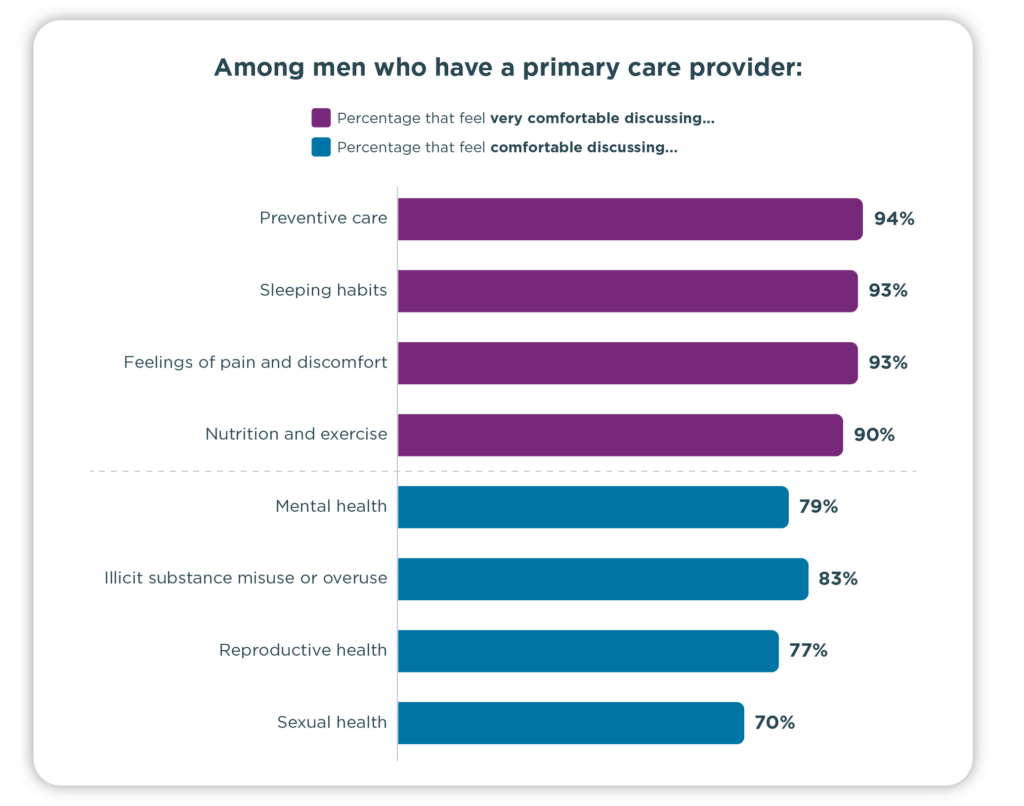
Personalized, relevant information about men’s health issues at the point of care can open the door to conversations men may otherwise avoid to drive real, positive change.
It’s no secret that men often shy away from seeking medical care or discussing health concerns with others. Social expectations and long-standing stereotypes about masculinity can make men feel like they need to “tough it out” rather than address their physical or mental health needs. As a result, too many men’s health issues remain undiscussed or untreated. Yet these issues—ranging from mental health struggles to conditions like heart disease and prostate cancer—are too critical to ignore.
The good news? When men do go to the doctor, personalized health messages open the door to conversations they may otherwise avoid and can make a real difference. Movember—a month set aside to encourage men to sport mustaches to raise awareness for men’s health issues—addresses the stigma and encourages men to take that essential first step in talking with their healthcare providers. One way to do this is to reach men where they are—especially in healthcare settings—and deliver content that empowers them to communicate with their doctors. The right message, delivered privately to them at the right time, can be the nudge men need to start prioritizing their health.
Why men’s health needs a spotlight
Many men’s health issues—especially mental health concerns—often go unnoticed or undiscussed. Phreesia’s research shows that the majority of men with a primary care provider feel very comfortable discussing preventive care, sleep, feelings of pain and discomfort, and nutrition and exercise. On the flip side, however, they’re significantly less comfortable discussing mental health, illicit substance misuse or overuse, or reproductive or sexual health.

This research is consistent with other studies:
- Men are more likely to die by suicide than women, according to the Centers for Disease Control and Prevention (CDC).
- However, according to the National Institute of Mental Health, men are less likely to have received treatment for mental health conditions than women in the last year.
In addition to mental health, conditions like prostate cancer and heart disease significantly impact men. The Prostate Cancer Foundation suggests that 1 in 8 men in the United States will be diagnosed with prostate cancer at some point in their lives. Although early detection can improve outcomes, men may avoid regular screenings due to fear, embarrassment or simply because it’s “easier” not to think about it.
“There are several barriers that men face in getting a prostate cancer diagnosis,” says Christina Nakamoto, PA-C, MPH, Medical Science Liaison at Myriad Genetics. “These include lack of awareness of prostate cancer screening and what it entails, lack of access to care and financial constraints, lack of trust in the healthcare system, and fear of a cancer diagnosis. There are several others, so it is extremely important to educate patients regarding the importance of screening for this treatable disease, and how to combat these barriers.”
Similarly, heart disease, the leading cause of death among men in the United States, often develops without noticeable symptoms, making early detection difficult—particularly when men do not regularly monitor their blood pressure or manage their cholesterol. As a result, many cases remain undiagnosed until severe complications arise.
The role of health education content in breaking down barriers
New research from IPG Mediabrands’ media intelligence unit MAGNA and health advertising platform DeepIntent shows that pharmaceutical ads play a valuable role in raising awareness of treatment options, informing consumers about health conditions and medications, and empowering people to make more informed healthcare decisions.
When these ads are tailored with personalized content that aligns with an individual’s specific needs—and are delivered at the point of care when patients are most receptive to receiving health-related messaging—their impact can be even more powerful.
For example, in 2024, Phreesia partnered with the Ad Council to launch a “Love, Your Mind” campaign from Huntsman Mental Health Institute. The campaign offered materials and guidance to encourage people to prioritize their mental health. As part of this campaign, Phreesia delivered more than 117,000 messages to Black and Hispanic men who consented to receive content—and, after viewing the campaign content, 56% of surveyed men said they were very likely to search for additional mental health information and support, and 60% said they intended to speak with their doctor about how to manage their mental wellbeing.
In another campaign that launched in March 2024, Phreesia has delivered—to date—309,421 messages about heart disease and ways to improve heart health to men who consented to receive content. The impact has been significant. Of the men surveyed after seeing the campaign:
- 69% said they were likely to talk to their doctor about heart disease risks and prevention
- 69% said they were likely to talk to their doctor about treatments for heart disease
- 61% said they were likely to search for more information about heart disease
Movember is all about raising awareness of men’s health issues—specifically mental health and prostate health—and awareness can help drive action. Personalized health messaging, delivered at the right moments, works. It not only raises awareness but also drives real, positive change in men’s lives and inspires them to become active participants in their own health. When men are aware of their health risks and the resources available to them, they’re more likely to take that first step—whether it’s speaking openly with a provider, asking questions about medications or recommended screenings, or even searching for more information—and it can transform how they approach their heath.
Learn how Phreesia can help you reach patients with relevant health information to engage them at critical moments in their healthcare journey.


